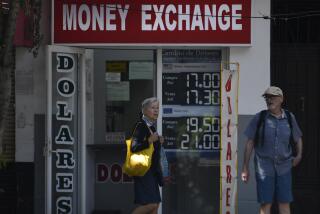Latin Markets Dive in ‘Tequila Effect’ Reaction to Mexico
- Share via
SANTIAGO, Chile — The Mexican financial crisis has given the rest of Latin America’s financial community a case of the shakes--the “tequila effect,” as newspapers have dubbed it.
With Tuesday’s bad news from Mexico, the volatile Buenos Aires stock market took one of its worst tumbles in these troubled three weeks. The Merval, an index of selected stocks, was down 9.59% at the close, and the general index closed at 6.49% below the day’s opening level.
The Peruvian stock exchange’s general index dropped 8.42% on Tuesday, the biggest dip since April 5, 1992, when President Alberto Fujimori closed the national Congress in a military-backed self-coup.
In neighboring Chile, an index of selected stocks called the IPSA fell 5.15% on Tuesday, while the general index was down 3.73% at closing.
And the Brazilian stock market tumbled throughout the day, closing with a 9.8% loss. That came on top of a series of nearly daily losses that total about 30% on the Brazilian bourse since the Mexican currency crisis began Dec. 20.
However, despite concerns in the United States that there could be a widespread flight of capital from Latin American countries, local economists and government officials say the parallels with Mexico are few and that the region’s major economies are sound.
The economies of Argentina, Chile and Peru have been growing vigorously, and none appears to have the kind of financial problems behind the Mexican debacle. But South American stock markets are notoriously unstable--and their ups and downs often do not reflect economic conditions in the countries.
As more and more Latin American stocks have been offered abroad, how they do in New York can drive bolsas in Buenos Aires, Sao Paulo, Santiago and Lima. Economists in Argentina say recent dips in the Buenos Aires exchange have reflected foreign insecurity over Latin America because of Mexico rather than specific concerns about conditions in Argentina.
In Brazil, the wisdom this week was that much of the flight by investors is driven by the need to cover losses in Mexico. Even with today’s accumulated losses, those who invested in Brazilian stock markets at the end of 1993, local officials reason, are still ahead by about 33%.
The “tequila effect” is “very irrational” and also worrisome, said Pablo Goldberg, an economist with the Buenos Aires research firm Macroeconomica. “We’re afraid that this situation could become generalized.”
Anxiety over Mexico has already resulted in liquidity problems for a few small “wholesale” banks in Buenos Aires. These banks take short-term deposits, often from large companies, and invest them in government securities. With the Mexican crisis, the values of government securities fell, and many companies began withdrawing funds from the small banks.
“They preferred to have the deposits in big banks for greater security,” Goldberg said. He said some multinational companies were withdrawing the funds on orders from their home offices abroad.
But he said most of the money withdrawn from wholesale banks apparently was not removed from Argentina, merely transferred to larger institutions.
Lacking liquidity to pay withdrawals, Banco Extrader and Finansur in Argentina have closed their doors.
*
Special correspondent Mac Margolis in Rio de Janeiro contributed to this report.
More to Read
Sign up for Essential California
The most important California stories and recommendations in your inbox every morning.
You may occasionally receive promotional content from the Los Angeles Times.










